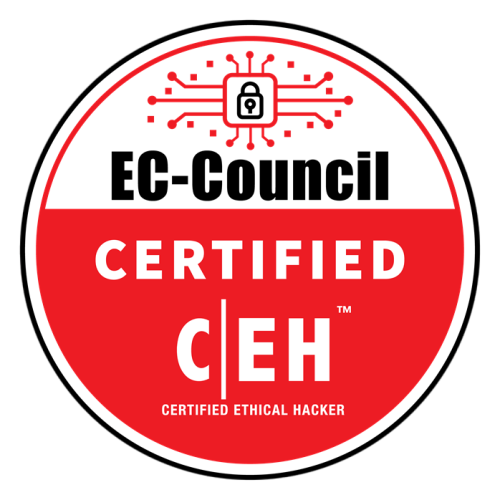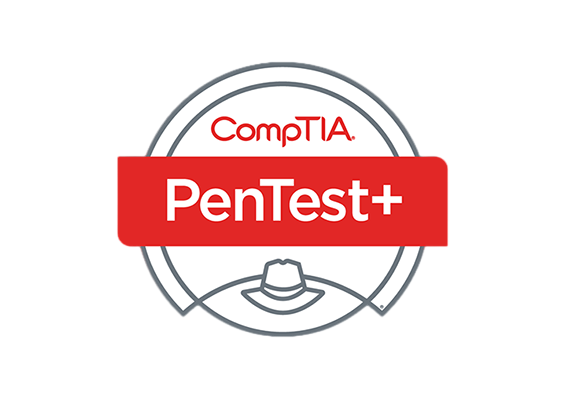
Certified Ethical Hacking Training in Lagos, Nigeria
Do you have a passion for technology and a desire to protect against malicious attacks? If yes, then all you need is Spraditech's Practical Intensive Training to become a Certified Ethical Hacker!
Spraditech's Ethical Hacking training/course provides you with the skills and knowledge to identify and defend against cyber-attacks, as well as use your skills for good as a professional ethical hacker.
Through hands-on learning, you'll explore the tools and techniques used by hackers, but with an ethical lens. You'll learn how to think like a hacker to anticipate their moves and protect against them.
Our expert instructors will guide you through the latest trends and methodologies in the field, giving you a complete understanding of how to protect against cybercrime.
Join a community of like-minded individuals and start your journey to becoming a certified ethical hacker.
Our course is designed for individuals with no prior hacking experience, making it accessible to everyone.
Enroll today and discover the thrill of using your skills for good. Protect against cyber-attacks and make a difference in the world of technology.
Take the first step and sign up for our Ethical Hacking course now!
Ethical Hacking Course Summary
📂Course Content: 21 Modules, 189 Lessons, 72 Assignments, 5 Capture the Flag (CTF) Exercises, and 15 Real World Projects
⏳Course Duration: 6 Months
🏆Certification: Spraditech's Certificate of Completion and EC-Council's CEH Certification
👨🏫Mode of Lecture: Either Onsite (Physical) or Virtual (Online)
📅Available Classes: Week-Day Classes and Week-End Classes.
⏰Time: 10AM - 2PM for Week-Day Classes and 10AM - 4PM for Week-End Classes
📌Venue: 7, St. Finbarr's College Road, Pako Bus/Stop, Akoka, Yaba, Lagos
💼Internship / Job Placement: Internship is available for all students while automatic job placement is only for the best graduating students.
💰Course Fee: #500,000 #300,000 only for all classes.
☎Call/WhatsApp: 08085596444
Ethical Hacking Course Enrollment Form

Fill the form below to enroll now!



Objectives of Spraditech Ethical Hacking Course
By the end of this training, you will be able to:
- Identify and assess vulnerabilities in computer systems and networks.
- Use the same tools and techniques as malicious hackers to find weaknesses in systems and networks.
- Implement best practices in security to protect against cyber attacks.
- Develop and implement security incident management procedures.
- Design and implement secure network and system architectures.
- Utilize cryptography to secure data.
- Work as an ethical hacker, performing penetration testing and vulnerability assessments for organizations.
- Continuously monitor and assess security systems to ensure ongoing protection against cyber threats.
- Communicate effectively with stakeholders about security risks and the measures being taken to address them.
Spraditech Ethical Hacking Course Outline
In order to achieve the above-mentioned objectives, this Ethical Hacking Training in Lagos, Nigeria shall comprise of the under-listed 21 Modules.
What You Will Learn in Each Module
Introduction to Ethical Hacking Module 1
This module provides a comprehensive overview of the principles and practices of ethical hacking.
In these initial weeks, students will develop a strong foundation in ethical hacking.
They will delve into the ethical and legal considerations surrounding hacking practices and gain a deep understanding of the differences between ethical and malicious hacking.
This module covers a wide range of common cybersecurity threats and attacks, allowing students to appreciate the potential vulnerabilities that exist in computer systems and networks.
- Definition of Ethical Hacking Lesson #1
- The need for Ethical Hackers Lesson #2
- The role of Ethical Hackers in organizations Lesson #3
- Legal and ethical considerations Lesson #4
- Ethical Hacking Vs Malicious Hacking Lesson #5
- Ethical Hacking Phases Lesson #6
- Overview of common cybersecurity threats and attacks Lesson #7
Introduction To Computer Networking Module 2
This segment is dedicated to building a solid understanding of computer networking.
Students will explore the intricacies of TCP/IP protocols and how these protocols can be exploited by malicious actors.
They will also study network devices, security mechanisms, and delve into IP addressing and subnetting.
This knowledge is pivotal for identifying and exploiting vulnerabilities within networked systems.
- Definition of Computer Networking Lesson #1
- TCP/IP protocols and their vulnerabilities Lesson #2
- Network devices and security Lesson #3
- Subnetting and IP addressing Lesson #4
- Network scanning and reconnaissance Lesson #5
- Network architecture and protocols (e.g., DNS, DHCP) Lesson #6
Footprinting and Reconnaissance Module 3
Footprinting and reconnaissance are crucial initial phases in any ethical hacking engagement.
This module equips students with the skills to collect essential information about a target system or organization, which forms the basis for planning subsequent hacking activities.
Students will learn various techniques and tools for information gathering, ensuring they have a comprehensive understanding of their target's digital footprint.
- Defining Footprinting & Reconnaissance Lesson #1
- Types of Footprinting Lesson #2
- Passive Footprinting Techniques Lesson #3
- Active Footprinting Techniques Lesson #4
- Reconnaissance Tools and Techniques Lesson #5
- Google Hacking Lesson #6
Networks Scanning and Penetration TestingModule 4
Network scanning and penetration testing are at the core of ethical hacking.
This module equips students with the skills and knowledge to identify vulnerabilities in target systems, exploit those weaknesses, and gain deeper insights into a network's security posture.
Students will learn how to conduct comprehensive network scans and follow up with targeted penetration testing to assess system vulnerabilities and potential risks.
- Introduction to Network Scanning Lesson #1
- Introduction to Penetration Testing Lesson #2
- Vulnerability Assessment and Management Lesson #3
- Network Scanning Techniques Lesson #4
- Penetration Testing Methodologies Lesson #5
- Reporting and Documentation Lesson #6
- Legal and Compliance Issues in Penetration Testing Lesson #7
Exploitation Module 5
This module equips students with the knowledge and skills needed to create, modify, and apply exploits effectively.
It covers the fundamentals of exploit development, various types of exploits, and the ethical and legal considerations associated with this aspect of ethical hacking.
Students will gain a profound understanding of the exploit development process and its application in penetration testing and vulnerability assessment.
- Understanding Exploits Lesson #1
- Exploitation Process Lesson #2
- Types of Exploits Lesson #3
- Buffer Overflow Lesson #4
- SQL Injection Lesson #5
- Cross-Site Scripting (XSS) Lesson #6
- Developing and Applying Exploits Lesson #7
- Exploits Mitigation Techniques Lesson #8
- Legal and Ethical Considerations Lesson #9
System Hacking Module 6
This module equips students with the knowledge and practical skills needed to compromise and gain control of computer systems, with a focus on understanding and bypassing security mechanisms, exploiting vulnerabilities, and maintaining access.
It also emphasizes ethical and legal considerations in system hacking practices.
- Types of System Hacks Lesson #1
- Password Cracking Techniques Lesson #2
- Privilege Escalation Lesson #3
- Rootkits and Stealth Techniques Lesson #4
- Backdoors and Remote Administration Tools Lesson #5
- Countermeasures Lesson #6
Malware Threats Module 7
Malware is a pervasive and evolving threat to computer systems and networks.
Understanding malware is crucial for ethical hackers as it plays a significant role in both offensive and defensive aspects of cybersecurity.
This module equips students with the knowledge and practical skills needed to recognize, analyze, and defend against malware threats.
It provides an understanding of different types of malware, their behavior, and the methods used for analysis and detection.
Students also learn about malware defense strategies and best practices to protect systems and networks.
- Definition of Malware Lesson #1
- Types of Malware Lesson #2
- Propagation Techniques Lesson #3
- Malware Detection Lesson #4
- Malware Analysis Techniques Lesson #5
- Malware Defense Strategies Lesson #6
Sniffing and Spoofing Module 8
This module equips students with the knowledge and practical skills needed to perform passive network monitoring (sniffing) and active network traffic manipulation (spoofing).
These skills are crucial for understanding network communication, identifying vulnerabilities, and assessing network security.
Ethical considerations and the responsible use of these techniques are emphasized throughout the module.
Students will be able to capture, analyze, and manipulate network traffic effectively and responsibly.
- Introduction to Network Sniffing Lesson #1
- Types of Sniffing Lesson #2
- Promiscuous Mode Lesson #3
- Packet Capture Tools Lesson #4
- ARP Poisoning Lesson #5
- Password Sniffing Lesson #6
- DNS and DHCP Attacks Lesson #7
- VoIP and Wireless Sniffing Lesson #8
- Sniffing in Encrypted Environments Lesson #9
- Filtering and Analysis Lesson #10
- Sniffing Tools and Techniques Lesson #11
- Introduction to Network Spoofing Lesson #12
- ARP Spoofing Lesson #13
- DNS Spoofing Lesson #14
- IP Spoofing Lesson #15
- Spoofing Tools Lesson #16
- Legal and Ethical Considerations Lesson #17
Social Engineering Module 9
Social engineering is a crucial aspect of ethical hacking, as it involves manipulating individuals to reveal confidential information or perform actions that may compromise security.
This module equips students with the knowledge and practical skills needed to understand, plan, and defend against social engineering attacks.
It covers a wide range of social engineering tactics, from basic to advanced, and emphasizes the psychological and behavioral aspects involved in these attacks.
Students will be able to recognize, defend against, and potentially execute social engineering tactics effectively, all while maintaining ethical and legal standards.
- Definition of Social Engineering Lesson #1
- Types of Social Engineering Lesson #2
- Psychological Principles Lesson #3
- Pretext Development Lesson #4
- Phishing Attacks Lesson #5
- Social Engineering Techniques Lesson #6
- Protecting against Social Engineering Lesson #7
Denial of Service (DoS) and Distributed Denial of Service (DDoS) Module 10
Denial of Service attacks aim to disrupt the availability of computer systems and networks.
Ethical hackers need to understand the methods and tools used in both DoS and DDoS attacks to protect against them and mitigate their impact.
This module covers a wide range of attack vectors, from basic to advanced, and emphasizes the strategies and best practices for mitigating the impact of these attacks.
Students will be able to protect against DoS and DDoS attacks effectively while adhering to ethical and legal standards.
- Definition of Denial of Service Lesson #1
- Types of Denial of Service Lesson #2
- Botnets and Zombies Lesson #3
- Amplification Attacks Lesson #4
- Denial of Service Techniques Lesson #5
- Protecting against Denial of Service Lesson #6
- Introduction to DDoS Attacks Lesson #7
- DDoS Attack Vectors Lesson #8
- DDoS Defense Strategies Lesson #9
- Incident Response Lesson #10
Session Hijacking Module 11
Session hijacking, also known as session fixation, is a critical topic in ethical hacking.
This module explores the techniques, tools, and methodologies used to hijack or manipulate user sessions on web applications.
Understanding session hijacking is essential for both offensive and defensive cybersecurity practices.
- Definition of Session Hijacking Lesson #1
- Types of Session Hijacking Lesson #2
- Session Management Lesson #3
- Session Fixation Attacks Lesson #4
- Session Hijacking Tools Lesson #5
- Session Hijacking Techniques Lesson #6
- Security Headers and HTTPS Lesson #7
- Protecting against Session Hijacking Lesson #8
Hacking Webservers Module 12
Hacking web servers is a core aspect of ethical hacking, allowing students to understand and identify vulnerabilities in web applications and server configurations.
This module covers the techniques, tools, and methodologies used to assess and compromise web servers for security assessment purposes.
- Introduction to Web Server Hacking Lesson #1
- Types of Web Servers Lesson #2
- Enumeration and Banner Grabbing Lesson #3
- Directory Traversal Lesson #4
- File Inclusion Vulnerabilities Lesson #5
- Exploiting Misconfigurations Lesson #6
- SQL Injection in Web Servers Lesson #7
- Cross-Site Scripting (XSS) Lesson #8
- Web Shell Upload and Backdoors Lesson #9
- Security Headers and HTTPS Lesson #10
- Web Application Firewalls (WAFs) Lesson #11
- Web Hacking Techniques Lesson #12
- Web Hacking Tools and Techniques Lesson #13
Hacking Web Applications Module 13
Hacking web applications is a critical aspect of ethical hacking, enabling students to identify and exploit vulnerabilities in web-based software.
This module equips students with the knowledge and practical skills needed to recognize, exploit, and defend against web application vulnerabilities.
It covers a wide range of vulnerabilities, from basic to advanced, and emphasizes the strategies and best practices for securing web applications.
Students will be able to assess and protect web applications effectively while adhering to ethical and legal standards.
- Introduction to Web Application Hacking Lesson #1
- Types of Web Applications Lesson #2
- Common Web Application Vulnerabilities Lesson #3
- Web Application Penetration Testing Methodologies Lesson #4
- Session Management Lesson #5
- Authentication and Authorization Bypass Lesson #6
- Authentication and Authorization Bypass Lesson #7
- Web Application Scanners Lesson #8
- Client-Side Attacks Lesson #9
- API and Mobile Application Testing Lesson #10
- Web Application Firewalls (WAFs) Lesson #11
- Web Application Hacking Tools and Techniques Lesson #12
- Countermeasures Lesson #13
Database Hacking Module 14
Database hacking is a fundamental aspect of ethical hacking, allowing students to understand how to identify and exploit vulnerabilities in database systems.
This module equips students with the knowledge and practical skills needed to recognize, exploit, and defend against database vulnerabilities.
It covers a wide range of vulnerabilities, from basic to advanced, and emphasizes the strategies and best practices for securing database systems.
Students will be able to assess and protect databases effectively while adhering to ethical and legal standards.
- Introduction to Database Hacking Lesson #1
- Types of Databases Lesson #2
- Database Vulnerabilities Lesson #3
- Data Exfiltration Techniques Lesson #4
- Database Scanners Lesson #5
- NoSQL Database Exploitation Lesson #6
- Authentication Bypass and Privilege Escalation Lesson #7
- Database Auditing and Logging Lesson #8
- Database Penetration Testing Methodologies Lesson #9
- Securing Databases Lesson #10
- Database Hacking Techniques Lesson #11
- Database Hacking Tools and Techniques Lesson #12
Wireless Hacking Module 15
Wireless hacking is a vital aspect of ethical hacking, allowing students to understand and manipulate wireless networks, including Wi-Fi and Bluetooth.
This module equips students with the knowledge and practical skills needed to recognize, exploit, and defend against wireless network vulnerabilities.
It covers a wide range of wireless technologies, from Wi-Fi to Bluetooth and IoT, and emphasizes the strategies and best practices for securing wireless networks.
Students will be able to assess and protect wireless networks effectively while adhering to ethical and legal standards.
- Introduction to Wireless Hacking Lesson #1
- Types of Wireless Networks Lesson #2
- Wireless Network Vulnerabilities Lesson #3
- Wireless Penetration Testing Methodologies Lesson #4
- Wireless Hacking Techniques Lesson #5
- Wireless Hacking Tools and Techniques Lesson #6
Mobile Hacking Module 16
Mobile hacking is an essential aspect of ethical hacking, enabling students to understand and manipulate mobile devices, including smartphones and tablets.
This module equips students with the knowledge and practical skills needed to recognize, exploit, and defend against mobile device and application vulnerabilities.
It covers a wide range of mobile technologies, from mobile operating systems to app security, and emphasizes the strategies and best practices for securing mobile devices and applications.
Students will be able to assess and protect mobile systems effectively while adhering to ethical and legal standards.
- Introduction to Mobile Hacking Lesson #1
- Types of Mobile Devices Lesson #2
- Mobile Operating Systems Lesson #3
- Mobile Application Vulnerabilities Lesson #4
- Mobile Application Scanners and Testing Tools Lesson #5
- Mobile Penetration Testing Methodologies Lesson #6
- Mobile Device Management Lesson #7
Evading IDS, Firewalls and Honeypots Module 17
Understanding how to evade Intrusion Detection Systems (IDS), Firewalls, and Honeypots is crucial for ethical hackers to assess and improve network security.
This module equips students with the knowledge and practical skills needed to recognize, evade, and defend against IDS, Firewalls, and Honeypots.
It covers a wide range of evasion techniques, from basic to advanced, and emphasizes the strategies and best practices for improving network security.
Students will be able to assess and enhance network defenses effectively while adhering to ethical and legal standards.
- Definition of IDS, Firewalls and Honeypots Lesson #1
- Types of IDS, Firewalls and Honeypots Lesson #2
- Evasion Techniques Lesson #3
- Countermeasures Lesson #4
- Legal and Ethical Considerations Lesson #5
Cloud Computing and IoT Security Module 18
Cloud and Internet of Things (IoT) security are critical components of modern cybersecurity.
This module equips students with the knowledge and practical skills needed to recognize, assess, and defend against security risks in cloud services and IoT devices.
It covers a wide range of security challenges, from cloud misconfigurations to IoT device vulnerabilities, and emphasizes the strategies and best practices for securing these environments.
Students will be able to assess and enhance cloud and IoT security effectively while adhering to ethical and legal standards.
- Definition of Cloud Computing Lesson #1
- Types of Cloud Computing Lesson #2
- Security Challenges in Cloud Computing Lesson #3
- IoT Device Vulnerabilities Lesson #4
- Penetration testing in the cloud and IoT Lesson #5
- Security for containerization and virtualization Lesson #6
- Protecting against Cloud Computing Threats Lesson #7
Cryptography Module 19
Cryptography is fundamental to modern cybersecurity.
This module equips students with the knowledge and practical skills needed to understand, implement, and assess cryptographic systems.
It covers a wide range of cryptographic methods, from fundamental encryption algorithms to advanced topics like quantum cryptography and blockchain.
Students will be able to leverage cryptography effectively to secure data and communication while adhering to ethical and legal standards.
- Definition of Cryptography Lesson #1
- Symmetric and Asymmetric Cryptography Lesson #2
- Encryption Algorithms Lesson #3
- Key Management Lesson #4
- Digital Signatures Lesson #5
- Cryptographic Protocols Lesson #6
- Cryptanalysis Lesson #7
- Public Key Infrastructure (PKI) Lesson #8
- Quantum Cryptography Lesson #9
- Blockchain and Cryptography Lesson #10
- Cryptography Techniques Lesson #11
- Cryptography Tools and Techniques Lesson #12
Incident Response and Forensics Module 20
Incident response and digital forensics are crucial aspects of ethical hacking, as they involve the identification, response, and recovery from security incidents, as well as the collection and analysis of digital evidence.
This module equips students with the knowledge and practical skills needed to respond to security incidents, conduct digital investigations, and analyze digital evidence.
It covers a wide range of incident response and forensic techniques, from incident detection to digital evidence analysis.
Students will be able to effectively handle security incidents, collect and analyze digital evidence, and adhere to ethical and legal standards during the process.
- Introduction to Incident Response Lesson #1
- Incident Detection and Classification Lesson #2
- Incident Triage and Containment Lesson #3
- Incident Communication Lesson #4
- Digital Evidence Preservation. Lesson #5
- Incident Response Tools. Lesson #6
- Introduction to Digital Forensics. Lesson #7
- Forensic Investigation Process. Lesson #8
- File Systems and Data Recovery. Lesson #9
- Network and Memory Forensics. Lesson #10
- Mobile and Cloud Forensics. Lesson #11
- Forensic Tools and Analysis. Lesson #12
Programming for Ethical Hacking Module 21
Programming is a fundamental skill for ethical hackers, enabling them to create custom tools, automate tasks, and understand vulnerabilities at a deeper level.
This module equips students with the programming skills needed to automate tasks, create custom tools, and develop exploits in ethical hacking.
It covers essential programming languages such as Python, Bash, and PowerShell, and emphasizes secure coding practices.
Students will be able to use programming as a powerful tool in ethical hacking while adhering to ethical and legal standards.
- Introduction to Python Lesson #1
- Python Basics Lesson #2
- Scripting and Automation Lesson #3
- Network Programming Lesson #4
- Web Scraping and APIs Lesson #5
- Creating Custom Tools Lesson #6
- Secure Coding Practices Lesson #7
- Bash Scripting Lesson #8
- PowerShell Scripting Lesson #9
- Building Exploits Lesson #10
- Reverse Engineering with Python Lesson #11
- Building a C2 (Command and Control) Framework Lesson #12
- Legal and Ethical Considerations Lesson #13
Benefits of Spraditech Ethical Hacking Training in Lagos
Comprehensive Skill Development
Our course equips you with a wide range of skills, from network penetration testing to vulnerability assessment, ensuring you're well-rounded in ethical hacking.
Expert Instructors
Learn from seasoned professionals with real-world experience in the field, gaining insights and guidance from the best in the industry.
Access to Premium Tools
Gain exclusive access to cutting-edge, premium hacking tools, enabling you to stay at the forefront of ethical hacking technology.
Hands-on Lab
Benefit from practical, hands-on labs, where you can practice and experiment with hacking tools in a controlled environment, cementing your understanding.
Personalized Guidance
Receive one-on-one mentorship and feedback tailored to your unique learning needs, ensuring your success and understanding of the material.
Flexible Learning Options
We offer both in-person and online courses, allowing you to choose the format that suits your schedule and preferences.
Capture The Flag (CTF) Exercises
Engage in "Capture the Flag" exercises that simulate real hacking scenarios, allowing you to apply your skills in a safe and controlled setting.
Internship Opportunity
Unlock the chance to apply your skills in a real-world setting through an internship, gaining valuable hands-on experience and potentially paving the way for a successful career in ethical hacking.
Job Placement Assistance
Receive support and guidance in finding employment opportunities in the cybersecurity industry, helping you transition from training to a fulfilling ethical hacking career.
Who Should Enroll For Spraditech Ethical Hacking Training in Lagos?
- Aspiring Ethical Hackers
- IT Professionals
- Network Administrators
- Security Analysts
- System Administrators
- Software Developers
- Anyone interested in cybersecurity
Frequently Asked Questions (FAQ)
Ethical hacking is the practice of testing and securing computer systems, networks, and applications to identify vulnerabilities before malicious hackers can exploit them.
Learning ethical hacking is essential in the modern world to protect organizations and individuals from cyber threats. It's a highly sought-after skill in the cybersecurity industry.
Yes, our course is designed to accommodate all skill levels, including beginners.
We offer a structured curriculum that starts with the fundamentals and gradually progresses to advanced topics.
Our expert instructors provide individualized guidance to ensure that you can grasp the concepts, even if you're new to the field.
There are no strict prerequisites, but a basic understanding of computer networks and operating systems can be helpful.
We recommend having a strong interest in cybersecurity and a commitment to learning and practicing the material.
The course duration and format may vary depending on whether you choose an in-person or online option.
Typically, our courses span several weeks or months, providing a comprehensive learning experience.
Yes, upon successfully completing the course, you will receive a certification recognized in the field of ethical hacking.
This certification can be a valuable addition to your resume when pursuing a career in cybersecurity.
Absolutely! We offer hands-on labs and "Capture the Flag" exercises to provide practical experience.
These activities allow you to apply what you've learned in a controlled environment, enhancing your skills and confidence.
You'll have access to expert instructors who provide personalized guidance, answer your questions, and offer feedback.
Additionally, you'll receive course materials, access to premium tools, and networking opportunities with professionals in the field.
Yes, we offer job placement assistance to help you transition from training to a career in ethical hacking.
We can provide guidance, connect you with potential employers, and assist in your job search.
Our course distinguishes itself through expert instructors with real-world experience, practical exercises, access to premium tools, internship opportunities, and job placement assistance.
We're dedicated to equipping our students with the skills and support they need to succeed in the field of ethical hacking.
You can enroll by filling the enrollment form above or contacting our admissions team (08085596444).
For more information, please reach out to our representatives, who will be happy to answer any additional questions and provide guidance on the enrollment process.
If you have any specific questions about our Ethical Hacking Course, please don't hesitate to contact us.
We're here to assist you in your journey to becoming a skilled ethical hacker and contributing to the world of cybersecurity.